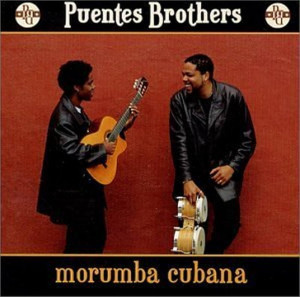 Mike Stiles wrote this review.
Mike Stiles wrote this review.
Alexis and Adonis Puentes are purveyors of the Cuban son (“sone”) musical tradition. As children they spent much time among artists the likes of whom frequented the legendary Buena Vista Social Club. Morumba Cubana is the brothers’ release that follows a tour of Canada and Europe, and believe you me it was a great thing they made it to the studio.
Alexis is the half of the team who plays the bass, nylon string guitar, tres, maracas, clave, chequere, bombo leguero, guiro, and egg. Adonis keeps things boppin’ on bongos and maracas. Both handle lead vocals extremely well. Joining them on this project are more than a dozen supporting artists on percussion, strings, winds, and keys.
Alexis’ song “Asegurate” is a great way to lead off the CD. His guitar styles range from melodic improvisations at a variety of paces to subtle brushwork rhythm. The gutsy lyrics exemplify this group’s approach, which is anything but milquetoast: “In her eyes shines / A light that dominates me / As if it were a dagger /Opening a wound.”
The third song slows us down, it’s a love ballad, “Desatino.” It has more than a little of the American big band jazz sound about it. The Frank Sinatra-ish vocal riffs never sounded this good until they were trilled in Cuban. And the jazz on the CD by no means ends here. “El Loco Bailarin (Crazy Dancer)” breaks out into a spontaneous jam from an island foot-stomper. “Esta Noche” has one of the finest acoustic chord arrangements I’ve heard from any band in the world, and “Son Para Nuestros Hijos” is worth the price of the CD alone for its flute solos.
The brothers do justice to their spiritual backgrounds. “La Rumba Primero” is a sort of invocation to the archetypal rumba player. “Encomienda” is a traditional-style homage to a patron saint. Speaking of tradition, “Timba en Trampa” makes the case that salsa came from the root of Cuban son. Add all that to the plain old fun stuff of the Latin world, like “Love Crazy” with its flirtation with the mariachi thing, and you have an awesome CD that makes me glad that it’s impossible to embargo music.
Morumba Cubana derives its heart and soul from the Puentes brothers, but the back-up talent really gets the numbers down, whether they’re playing something from a street corner in Havana to a bewitching passage straight from a village in the hills to a commercial airplay-ready tune. The liner-notes guide the listener through the various Latin forms (samba, rumba, etc.), and the English translations of the lyrics are quite imaginative. A lot of work went into making this CD accessible to the world community as a much-appreciated window into the soul of Cuba.
(Alma Records, 2000)
